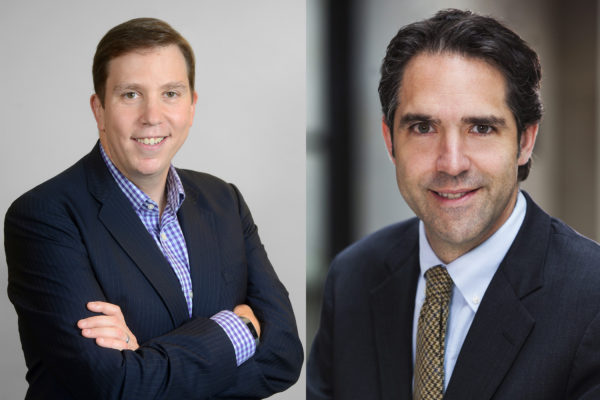Stephen Vladeck, the A. Dalton Cross Professor in Law at The University of Texas School of Law, and Robert Chesney, the law school’s associate dean for academic affairs, often disagree, but they have always managed to stay friends.
“(We thought) it might be useful to actually take the conversations that we were already having and record them and put them out on the internet,” Vladeck says. “In the hopes that maybe, whether people agree with us or not, they would at least learn something from both the substance of what we’re saying and from our ability to disagree without being disagreeable.”
This led to the creation of “The National Security Law Podcast” in January 2017, when Vladeck and Chesney were teaching their course on national security law. The podcast, Vladeck says, aims for “sober, serious, high-minded discussions of current issues in national security law that go beyond the divisive political rhetoric that characterizes so much of our current public discourse.” Every week they pick a topic — recent court decisions, policy initiatives, news stories, important historical episodes — and let the conversations unfold naturally.
“It was important for us that this never feel onerous,” Vladeck says. “So, we prep a little bit. We don’t just sort of make everything up we say on the air, although it might sometimes seem like we do.”
They try to keep production time about equal to recording time, Vladeck says, to minimize the possibility of turning a one-hour conversation into a three-hour editing project. This helps them keep their work at the university and their home lives balanced.
“We usually record in one take. We don’t spend a lot of time producing the recording, other than to just do a couple of small little things to make it air-able quality,” Vladeck says.
You learn more from people you don’t agree with than those you agree with."
The podcast does not solely focus on politics. Vladeck says there is space in every episode for what he and Chesney call “frivolity,” including discussions of books they’re reading and TV shows or films they’re watching. This is intended not only to give a more pleasant ending to a sometimes-unpleasant discussion but also to engage listeners.
“We do sometimes struggle to figure out what else to put in that part of the show,” Vladeck says. “But part of why we like that is because even if some of the more academic parts of the episode are above folks’ heads, we hope the frivolity never is.”
Vladeck says he hopes the podcast can educate listeners, whether they are legal experts or college students.
“I don’t think the topic necessarily appeals to the median American podcast listener,” Vladeck says. “My hope is that it’s sufficiently accessible, even for folks who haven’t been with us for all 125 episodes. Someone who is not an expert in the field, but who’s just curious, would not only enjoy it but might even learn from it.”
Chesney says their conversations help him keep abreast of current events and that the debates are an intellectual “sparring match” that he looks forward to every week.
“It ensures I sit down with my buddy every week, and so that alone is valuable,” Chesney says. “I learned a ton from him. You learn more from people you don’t agree with than those you agree with, so I learned a lot every week, and hopefully he feels the same. It is a good discipline to make sure that I’m keeping up with my field in a very comprehensive way every single week. And you know, frankly, that’s hard to do otherwise.”
Vladeck agrees that the podcast has helped him think deeply about what’s going on in the world.
“I think the value to me is a chance to actually have to think about these issues and not just see a tweet about them and be dismissive,” he says. “To think through some of the harder questions that policymakers and lawmakers face in this space — that’s immensely valuable to me, wholly apart from the excuse to sort of periodically cross swords with Bobby. It’s also fun to razzle him.”
This is the first in an occasional series of features about UT staffers and faculty members who are creating podcasts, either as part of their work at the university or as passion projects. Do you know a campus podcaster we should consider for a future issue of Texas Connect? Send your suggestions to pitch@texasconnect.utexas.edu.




